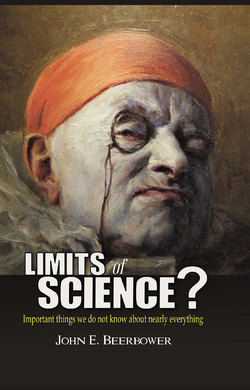Читать книгу Limits of Science? - John E. Beerbower - Страница 49
На сайте Литреса книга снята с продажи.
A hostage to mathematics?
ОглавлениеIt is often observed that contemporary science is almost all mathematics. See, e.g., Barrow, Theories of Everything, p.174 (“Modern science is founded almost entirely upon mathematics.”); Kline, Mathematics, p.361 (“…our best knowledge of the physical world is mathematical knowledge”), p.555 (“[i]n all of these and in other significant and powerful bodies of science, mathematics, as we now know, is the method of construction, the framework, and indeed the essence”); Wigner, “The Unreasonable Effectiveness,” p.1. In fact, that is an overstatement, for several reasons. For example, it is not true of modern biology. However, as discussed further below, it does seem accurately to reflect the state of modern physics, including particle physics and cosmology.24
We have found that many physical phenomena are susceptible to mathematical modeling. It is certainly not obvious that it had to be so. The apparent congruence between mathematics and the physical world is characterized by Cox and Forshaw as “one of the deepest and in some ways most mysterious insights into the workings of modern science. Physical objects out there in the real world behave in predictable ways, using little more than the same basic laws of mathematics Pythagoras probably knew about when he set about to calculate the properties of triangles.” Why Does E=mc2?, pp.24–25.25 They, like many others, cite to the lecture by Wigner, discussed above, relying mainly upon the title: “The Unreasonable Effectiveness of Mathematics in the Natural Sciences.”
Theoretical physicist Lee Smolin expresses some frustration with the emphasis placed upon mathematics in the development of scientific theories. He asserts that it is absurd to think that “mathematics is prior to nature. Math in reality comes after nature. It has no generative power. …[I]n mathematics conclusions are forced by logical implication, whereas in nature events are generated by causal processes operating in time. …[L]ogical implications can model aspects of causal processes, but they’re not identical to causal processes. …Logic and mathematics capture aspects of nature, but never the whole of nature.” Time Reborn, p.246. Smolin does not manage actually to address the question raised here of why it is that mathematics seems to be able to “capture aspects of nature” and whether the aspects captured by the mathematics or the aspects that are left out are the things that really matter. Nonetheless, as we shall see in a later chapter, there are a host of examples where I conclude that mathematics has in a sense taken the science hostage and led us in directions that, at least, merit re-examination.
The curiosity is not that certain specific observed relationships can be depicted by a mathematical formula, but that a few of such formulae corresponding to observed physical relationships can be incorporated into a mathematical system that will enable the user to compute other relationships that can then be observed in fact. In other words, whole complex structures in mathematics can have their analog in the physical world.
One could assert that some regularity and causal relationships are necessary features of the physical world, otherwise we would not find a structured Universe. But, that observation does not explain very much. It simply says that if it were not so, this world would not be. Maybe that is all that we can say, but it is not very satisfying nor, one suspects, the whole story.
Thus, we are left with no real answer to the question posed of why mathematics is so useful or to the derivative question of what are the limits, if any, to the use of mathematics to describe the physical world. It seems that we are just left with the fact that relative to much of the physical world, mathematics seems to work. But, to be consistent with what we have said about induction, past success cannot be taken as a guarantee of future success. Moreover, even if mathematics reflects many important relationships in the physical world, it may not capture the relationships of many other aspects of our “natural world” that we seek to understand. There may be very significant areas that may come someday to be called science but that are not capable of representation by equations or other tools of mathematics. Nonetheless, it is easy to note that there may be, or even probably are, limitations to knowledge based upon mathematics. What is hard is to figure out what those limitations are and what could supplement or replace our knowledge based upon mathematics.
Kline concludes his book with these observations: “One should also question the extent to which mathematics really represents the physical world. …It treats those physical concepts which can be represented by numbers or geometrical figures. But physical objects possess other properties as well. …[The use of mathematics] may cause us to look at the world with blinders. …It may be that man has introduced some limited and even artificial concepts and only in this way has managed to institute some order in nature. …[But,] [i]n those domains where it is effective it is all we have; if it is not reality itself, it is the closest to reality we can get.” Mathematics, pp.554, 555.
